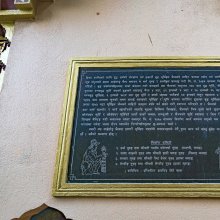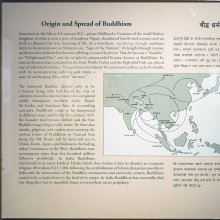Vishvasa, Viśvāsa: 11 definitions
Introduction:
Vishvasa means something in Hinduism, Sanskrit, the history of ancient India, Marathi, Hindi. If you want to know the exact meaning, history, etymology or English translation of this term then check out the descriptions on this page. Add your comment or reference to a book if you want to contribute to this summary article.
The Sanskrit term Viśvāsa can be transliterated into English as Visvasa or Vishvasa, using the IAST transliteration scheme (?).
Alternative spellings of this word include Vishwas.
Images (photo gallery)
India history and geography
Source: Cologne Digital Sanskrit Dictionaries: Indian Epigraphical GlossaryViśvāsa.—(EI 24), official designation; same as Vaiśvāsika; cf. the titles Viśvāsa-Khāna, Viśvāsa-rāya, etc., conferred by the Muslim rulers especially in the Bengal region. Note: viśvāsa is defined in the “Indian epigraphical glossary” as it can be found on ancient inscriptions commonly written in Sanskrit, Prakrit or Dravidian languages.

The history of India traces the identification of countries, villages, towns and other regions of India, as well as mythology, zoology, royal dynasties, rulers, tribes, local festivities and traditions and regional languages. Ancient India enjoyed religious freedom and encourages the path of Dharma, a concept common to Buddhism, Hinduism, and Jainism.
Languages of India and abroad
Marathi-English dictionary
Source: DDSA: The Molesworth Marathi and English Dictionaryviśvāsa (विश्वास).—m (S) Trust, confidence, reliance: also faith, belief, assurance.
--- OR ---
visvāsa (विस्वास).—&c. Corruptions of viśvāsa &c.
Marathi is an Indo-European language having over 70 million native speakers people in (predominantly) Maharashtra India. Marathi, like many other Indo-Aryan languages, evolved from early forms of Prakrit, which itself is a subset of Sanskrit, one of the most ancient languages of the world.
Sanskrit dictionary
Source: DDSA: The practical Sanskrit-English dictionaryViśvāsa (विश्वास).—
1) Trust, confidence, faith, reliance; दुर्जनः प्रियवादीति नैतद्विश्वासकारणम् (durjanaḥ priyavādīti naitadviśvāsakāraṇam); विश्वासोपगमादभिन्नगतयः शब्दं सहन्ते मृगाः (viśvāsopagamādabhinnagatayaḥ śabdaṃ sahante mṛgāḥ) Ś.1.14; R.1.51; H.4.13; न मातरि न दारेषु न सोदर्ये न चात्मनि । विश्वासस्तादृशः पुंसां यादृङ्मित्रे स्वभावजे (na mātari na dāreṣu na sodarye na cātmani | viśvāsastādṛśaḥ puṃsāṃ yādṛṅmitre svabhāvaje) Pt.
2) A secret, confidential communication.
Derivable forms: viśvāsaḥ (विश्वासः).
Source: Cologne Digital Sanskrit Dictionaries: Shabda-Sagara Sanskrit-English DictionaryViśvāsa (विश्वास).—m.
(-saḥ) 1. Trust, faith, confidence. 2. A confidential communication. E. vi before śvas to breathe or live, aff. ghañ .
Source: Cologne Digital Sanskrit Dictionaries: Benfey Sanskrit-English DictionaryViśvāsa (विश्वास).—i. e. vi-śvas + a, m. 1. Confidence, trust, [Pañcatantra] ii. [distich] 23. 2. Faith, [Vikramorvaśī, (ed. Bollensen.)] 71, 13. 3. Secret, [Hitopadeśa] 73, 16.
Source: Cologne Digital Sanskrit Dictionaries: Cappeller Sanskrit-English DictionaryViśvāsa (विश्वास).—[masculine] confidence, trust in ([locative], [genetive] [instrumental] ±saha, or —°); private communication, secret.
Source: Cologne Digital Sanskrit Dictionaries: Monier-Williams Sanskrit-English Dictionary1) Viśvāsa (विश्वास):—[=vi-śvāsa] [from vi-śvas] m. confidence, trust, reliance, faith or belief in ([locative case] [genitive case] [instrumental case] with or without saha, or [compound]), [Mahābhārata; Kāvya literature] etc.
2) [v.s. ...] a confidential communication, secret, [Daśakumāra-carita; Hitopadeśa]
Source: Cologne Digital Sanskrit Dictionaries: Yates Sanskrit-English DictionaryViśvāsa (विश्वास):—[vi-śvāsa] (saḥ) 1. m. Trust, faith.
Source: DDSA: Paia-sadda-mahannavo; a comprehensive Prakrit Hindi dictionary (S)Viśvāsa (विश्वास) in the Sanskrit language is related to the Prakrit word: Vissāsa.
[Sanskrit to German]
Sanskrit, also spelled संस्कृतम् (saṃskṛtam), is an ancient language of India commonly seen as the grandmother of the Indo-European language family (even English!). Closely allied with Prakrit and Pali, Sanskrit is more exhaustive in both grammar and terms and has the most extensive collection of literature in the world, greatly surpassing its sister-languages Greek and Latin.
Hindi dictionary
Source: DDSA: A practical Hindi-English dictionaryViśvāsa (विश्वास) [Also spelled vishwas]:—(nm) belief, trust, faith; reliance, confidence; assurance; ~[ghāta] betrayal, treachery, violation of trust; infidelity; •[karanā] to blow the gaff; to betray, to betray one’s trust; ~[ghātī] treacherous, one who betrays, a traitor; ~[pātra/bhājana] a reliable/trustworthy/dependable (person), confidant; ~[prada] arousing or raising trust/reliance/belief; -[bhaṃga] breach of trust/faith; betrayal; ~[haṃtā] a traitor, (one) who betrays; —[uṭhanā] to lose faith/confidence (in); —[upajanā] confidence to be created; to begin to have trust (in); —[karanā] to trust, to rely, to believe; —[jamānā] to arouse confidence/trust, to earn somebody’s confidence; —[dilānā] to assure, to arouse confidence; —[hila uṭhanā] faith/confidence to be shaken.
...
See also (Relevant definitions)
Starts with (+53): Vishva, Vishva-cakkaratanam, Vishvasa-rakhnu, Vishvasabhajana, Vishvasabhanga, Vishvasabhumi, Vishvasadevi, Vishvasaghata, Vishvasaghataka, Vishvasaghataki, Vishvasaghati, Vishvasaghatin, Vishvasah, Vishvasaha, Vishvasahantri, Vishvasahartri, Vishvasahasra, Vishvasahaya, Vishvasahva, Vishvasahvan.
Ends with: Amdhavishvasa, Anavishvasa, Atmavishvasa, Avishvasa, Dvishvasa, Gatavishvasa, Jatavishvasa, Korada Vishvasa, Pranakrishna vishvasa, Upajatavishvasa, Vagvishvasa, Varna-vishvasa, Vishva.
Full-text (+70): Vishvasaghata, Vishvasapatra, Vishvasaghataka, Vishvasasthana, Vishvasabhumi, Vishvasabhanga, Vishvasin, Vishvasaprada, Vishvasakrit, Vishvasakarana, Vishvasapratipanna, Vishvasaghatin, Vaishvasika, Avishvasa, Vishvasakarya, Vishvasopagama, Vishvasaikasara, Vissasa, Vishvasaraya, Vishvasajanman.
Relevant text
Search found 22 books and stories containing Vishvasa, Vi-shvasa, Vi-śvāsa, Vi-svasa, Viśvāsa, Visvasa, Visvāsa; (plurals include: Vishvasas, shvasas, śvāsas, svasas, Viśvāsas, Visvasas, Visvāsas). You can also click to the full overview containing English textual excerpts. Below are direct links for the most relevant articles:
Prasthanatrayi Swaminarayan Bhashyam (Study) (by Sadhu Gyanananddas)
12.2. Virtues Helpful in Spiritual Progress < [Chapter 4 - Analysis on the Basis of Spiritual Endeavour]
Bhakti-rasamrta-sindhu (by Śrīla Rūpa Gosvāmī)
Verse 1.2.191 < [Part 2 - Devotional Service in Practice (sādhana-bhakti)]
Verse 3.3.106 < [Part 3 - Fraternal Devotion (sakhya-rasa)]
Kavyamimamsa of Rajasekhara (Study) (by Debabrata Barai)
Part 5.7 - Incidental disadvantages of Kavi (poet) for writing Poetry < [Chapter 5 - Analyasis and Interpretations of the Kāvyamīmāṃsā]
The Tattvasangraha [with commentary] (by Ganganatha Jha)
Verse 3244-3246 < [Chapter 26 - Examination of the ‘Person of Super-normal Vision’]
Garga Samhita (English) (by Danavir Goswami)
Verse 2.18.35 < [Chapter 18 - The Sight of Śrī Kṛṣṇacandra]
Yoga-sutras (Ancient and Modern Interpretations) (by Makarand Gopal Newalkar)
Concept of mokṣa according to Dvaitādvaita Darśana < [Introduction]


